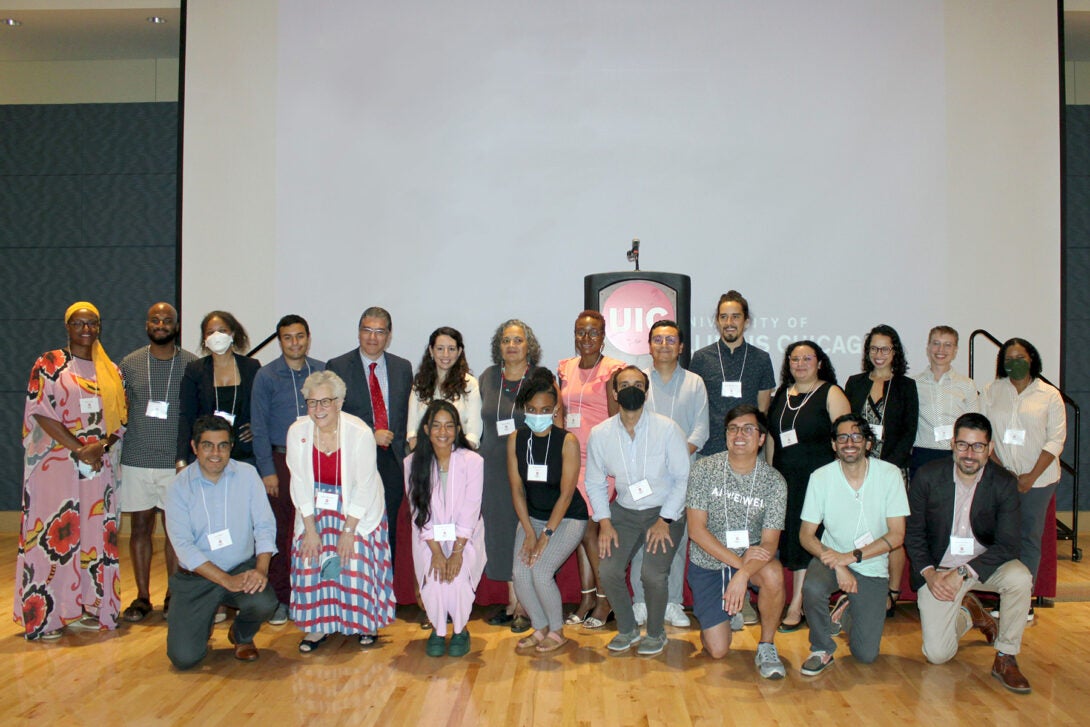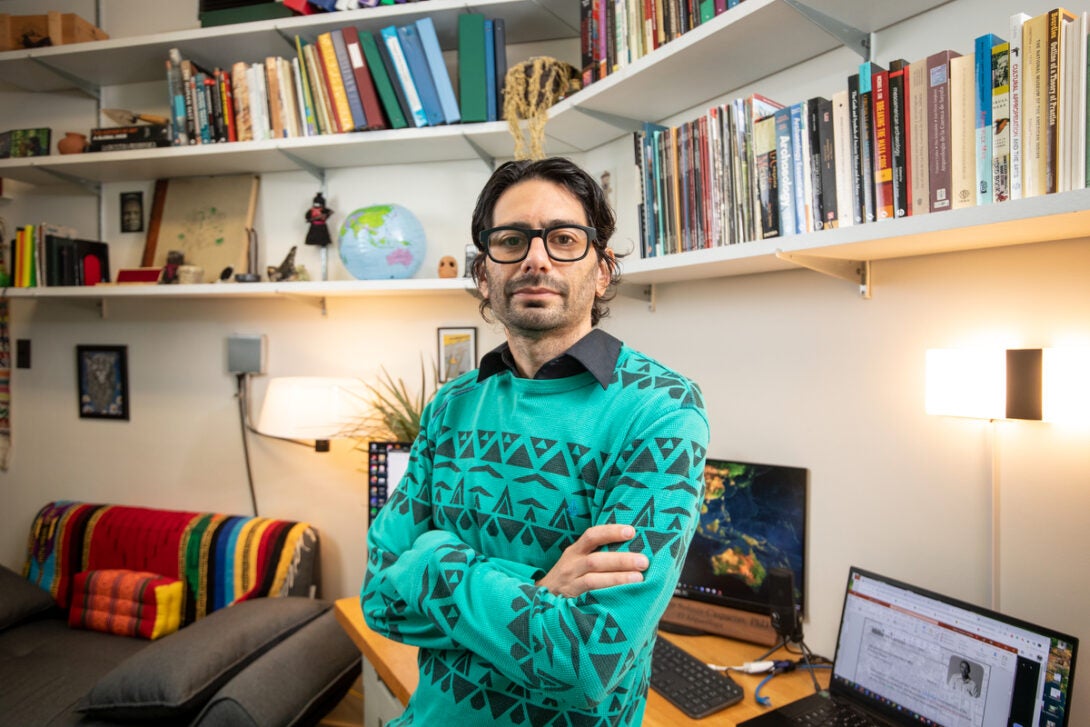Bridge to Faculty continues to grow as first cohort becomes faculty
x

Diversity officials at the University of Illinois Chicago are announcing a new cohort of Bridge to Faculty scholars as they celebrate the initial group of scholars transitioning to become UIC faculty members.
The Bridge to Faculty program, which is entering its third year, is designed to increase faculty diversity at UIC. The program, also known as B2F, was created in the summer of 2019, and this fall welcomes seven new scholars.
The 2022 scholar cohort was recognized at a recent in-person reception honoring the new scholars, continuing scholars and new faculty members.
UIC Interim Chancellor Javier Reyes said the program has been such a success that many Hispanic-Serving Institutions across the country are developing similar initiatives to diversify faculty. He congratulated all the scholars and departments for creating an environment to champion diversity.
He credited Amalia Pallares, vice chancellor for diversity, equity and engagement, for developing the initiative, which is coordinated through the Office of Diversity, Equity and Engagement.
“I have no doubt that this will be another blueprint for the nation on how to create a culture from the departments and their needs to advance racial equity,” Reyes said. “This is working — let’s continue to work to champion diversity at UIC.”
David Hernández Uribe, in the department of earth and environmental sciences, said he is happy to begin the program as a new scholar because it gives researchers a way to ease into the faculty position. The two-year program allows him and other Bridge to Faculty scholars time to search for funding, develop research ideas and check in with advisers on tenure-track career paths.
“That’s a really important part of the program; it puts together a really diverse group of people who will make science richer,” said Hernández Uribe, a geologist whose research centers on using rocks to understand the evolution of continents.
Tristesse Burton, a Chicago native in the department of pharmacy practice, called the program a “phenomenal opportunity” for individuals like herself who are underrepresented in academia. The program allows them to “situate ourselves on an even playing field,” said Burton, whose research addresses perinatal health for maternal mortality among Black and Indigenous women.
“I am very excited. I like the great opportunity to work in a cohort setting so we will be able to hold each other accountable and also lean on each other for advice,” Burton said.
Andrea Monteiro, in the department of pharmacy practice, said as a member of the newest cohort, she looks to the success of the two previous cohorts as inspiration. Her research focuses on patient-reported outcomes and preferences.
“It gives you hope. What I love about this program is the fact that there is a structured way of taking you in and showing you the way of becoming an independent researcher,” Monteiro said. “This can be a very frustrating moment in your life.”
Other members of the new cohort include:
- David Ansari, in the department of medical education, whose research focuses on the mental health and well-being of health professionals and how health professionals support vulnerable clients.
- Mayra Guerrero, in the department of psychology, whose research centers on examining the social and contextual factors promoting the well-being of marginalized populations.
- David López-García, in the department of urban planning and policy, whose postdoctoral research project examines inequalities of accessibility to jobs mediated by race and socioeconomic characteristics in U.S. cities.
- Ignacio Escalante Meza, in the department of biological sciences, who is a tropical biologist studying the mechanisms of animal behavior through the lenses of ecology and evolutionary biology.
Pallares said the program is currently working on gathering new scholars for the fourth cohort for the fall of 2023. She said the fact that all 10 of the original members of the first cohort have transitioned to become faculty members is a milestone.
“This is a community program; it is really about building a connected community we want for our scholars to come to and become successful with,” Pallares said. “Your energy, enthusiasm and brilliance have reinvigorated us.”
The seven new scholars are joining the 17 members in the second cohort.
The aim of Bridge to Faculty is to provide time and resources to allow scholars to establish their research and support their success and potential transition to a tenure-track position. The scholars’ research spans a wide variety of disciplines and departments throughout the university.
x

Mexican archaeologist Rodrigo Solinís-Casparius is part of the first cohort and is now an assistant professor of anthropology at UIC.
His work examines ancient urbanism and how people lived and constructed cities, particularly in ancient Mexico and Central America. He also focuses on technology to map and study archaeological remains and the work that archaeologists do with local and Indigenous communities to create and recover knowledge, Solinís-Casparius said.
“Being a B2F scholar put me close to resources, initiatives and work done by the Office of Diversity, Equity and Engagement and other units,” Solinís-Casparius said. “Whatever the field, B2F is a robust program that helps junior scholars develop their work, integrate into the UIC community and transition to faculty while appreciating the privilege to serve students from underrepresented identities.”
José Villegas, who grew up dividing his time between the United States and Mexico, was in the first cohort and became a faculty member three weeks ago. Villegas, who is in the department of pharmaceutical sciences, said he was able start his research early, which he can continue with as a professor. He was able to set up a lab and recruit students to work on his research.
“Typically, you’re trying to do research and at the same time land a faculty position, but here you’ve gotten that out of the way and are ready to commit to a certain place,” Villegas said.
Along with Solinís-Casparius and Villegas, other members who have transitioned to faculty from the first cohort include Marisol Becerra, Lawrence Brown, Roselyne Gérazime, Jarrad Hampton-Marcell, Maria Eugenia López-Garcia, Annette Martín, Marcus Michelen and Stephanie Torres. Ariel Smith, a scholar affiliate, has also successfully transitioned to faculty. One scholar from the second cohort, Gabriela Nunez-Mir, has also transitioned to faculty.